-
 Outkast, White Stripes, Cyndi Lauper among Rock Hall inductees
Outkast, White Stripes, Cyndi Lauper among Rock Hall inductees
-
Putin orders three-day truce in May but Ukraine asks 'Why wait?'
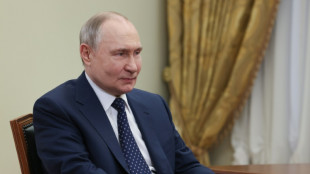
-
 Eubank Jr discharged from hospital following boxing grudge match
Eubank Jr discharged from hospital following boxing grudge match
-
China deploys army of fake NGOs at UN to intimidate critics: media probe
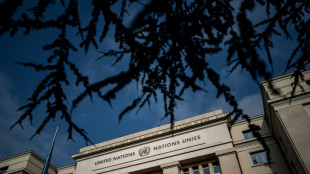
-
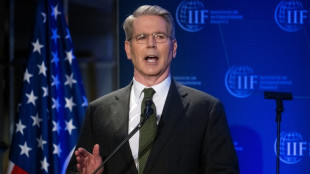 Empty shelves? US Treasury secretary not concerned 'at present'
Empty shelves? US Treasury secretary not concerned 'at present'
-
Slot told Liverpool they could win the league at season start: Konate

-
 Spain brought to a halt by huge blackout
Spain brought to a halt by huge blackout
-
Stock markets mostly higher amid trade talk hopes

-
 Conclave starts May 7, with cardinals saying new pope must tackle abuse
Conclave starts May 7, with cardinals saying new pope must tackle abuse
-
Massive blackout hits Spain and Portugal

-
 Ruediger 'must show respect to others' says Germany boss Voeller
Ruediger 'must show respect to others' says Germany boss Voeller
-
As Canada votes, Trump pushes US takeover plan
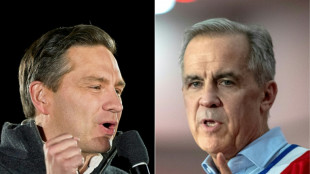
-
 Ten on trial in Paris over 2016 gunpoint robbery of Kim Kardashian
Ten on trial in Paris over 2016 gunpoint robbery of Kim Kardashian
-
African players in Europe: Salah scores, takes selfies as Reds seal title

-
 Bangladesh spinner Taijul's 5 wickets trigger Zimbabwe collapse in 2nd Test
Bangladesh spinner Taijul's 5 wickets trigger Zimbabwe collapse in 2nd Test
-
French mosque murder suspect, 21, surrenders in Italy

-
 Mayor Khan keen for London to make Olympics history
Mayor Khan keen for London to make Olympics history
-
Iranian president visits Azerbaijan as ties warm

-
 What we know ahead of the conclave
What we know ahead of the conclave
-
Jannik Sinner launches foundation supporting children

-
 Villagers on India's border with Pakistan fear war
Villagers on India's border with Pakistan fear war
-
Putin announces surprise Ukraine truce for May 8-10

-
 Conclave to elect new pope starts May 7
Conclave to elect new pope starts May 7
-
Stock markets mostly rise amid trade talk hopes

-
 India says signs deal with France for 26 Rafale fighter jets
India says signs deal with France for 26 Rafale fighter jets
-
Trump's deep-sea mining order violates global norms: France

-
 India Kashmir crackdown sparks anger as Pakistan tensions escalate
India Kashmir crackdown sparks anger as Pakistan tensions escalate
-
Russia says claims over annexed Ukraine regions key to peace

-
 Austrian climber dies on Nepal mountain
Austrian climber dies on Nepal mountain
-
Fires rage 2 days after Iran port blast killed 46

-
 Palestinian official tells ICJ Israel using aid blockage as 'weapon of war'
Palestinian official tells ICJ Israel using aid blockage as 'weapon of war'
-
France arrests 25 in police raids after prison attacks

-
 Kim Kardashian's next star turn is in a Paris courtroom
Kim Kardashian's next star turn is in a Paris courtroom
-
Syria group says military chief arrested in UAE

-
 Anger in Indian Kashmir at demolitions and detentions
Anger in Indian Kashmir at demolitions and detentions
-
Italy bank merger wave heats up as Mediobanca eyes Banca Generali
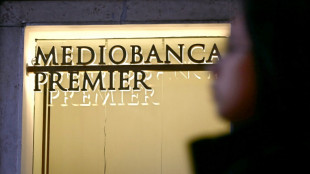
-
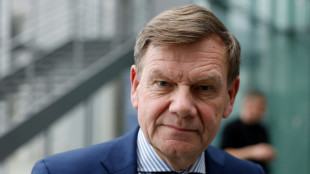 Putin critic Johann Wadephul, Germany's incoming foreign minister
Putin critic Johann Wadephul, Germany's incoming foreign minister
-
Cardinals expected to pick conclave date to elect new pope

-
 French mosque murder suspect arrested in Italy
French mosque murder suspect arrested in Italy
-
China says on 'right side of history' in trade standoff with US

-
 Stock markets mostly rise as investors eye trade talks
Stock markets mostly rise as investors eye trade talks
-
Fires rage 2 days after Iran port blast killed 40

-
 Yemen's Huthi rebel media says 68 killed in US strikes on migrant centre
Yemen's Huthi rebel media says 68 killed in US strikes on migrant centre
-
Man rescued from Mount Fuji twice in one week: reports

-
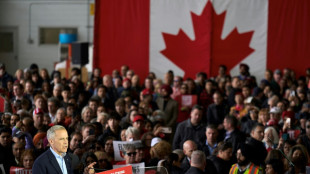 Canada votes for new government to take on Trump
Canada votes for new government to take on Trump
-
Top UN court to open hearings on Israel's aid obligation to Palestinians

-
 Philippines denies 'irresponsible' Chinese report on disputed reef
Philippines denies 'irresponsible' Chinese report on disputed reef
-
T'Wolves win to push Lakers to brink, Celtics, Knicks and Pacers win

-
 Myanmar marks month of misery since historic quake
Myanmar marks month of misery since historic quake
-
South Korea's SK Telecom begins SIM card replacement after data breach

Meta's announcements and digital services?
Recent announcements by Meta, the technology conglomerate formerly known as Facebook, are raising questions about compliance with new and upcoming European digital regulations. In particular, critics argue that Meta’s proposed changes—ranging from expanded encryption options to the way it handles user data—could conflict with the European Union’s (EU) Digital Services Act (DSA).
The Digital Services Act is part of the EU’s broader effort to modernize internet governance, alongside the Digital Markets Act (DMA) and other legislation.
The DSA aims to:
- Increase Transparency: Large online platforms must disclose how their algorithms rank content and ads.
- Enhance Accountability: Platforms must tackle illegal or harmful content promptly, and offer clear mechanisms for users to report it.
- Protect User Rights: Users should be able to appeal content takedowns and have better insight into how and why posts are removed or demoted.
These rules place heightened responsibilities on big tech companies—those classified as “very large online platforms” with tens of millions of European users.
Meta’s Recent Announcements:
Over the past few months, Meta has shared several updates about its business strategy and platform operations, including:
- Increased End-to-End Encryption: Meta plans to make messaging on Facebook Messenger, Instagram, and WhatsApp more robustly encrypted.
- Data Collection and Personalization: Meta continues to prioritize data-driven ad targeting, which remains a central component of its revenue model.
- Content Moderation Tools: The company has signaled new automated detection systems to handle harmful content.
At first glance, these moves might appear aligned with a more privacy-focused approach. However, some experts contend that the heightened encryption and ongoing data collection practices might not fully align with the EU’s expectations for transparency, oversight, and user empowerment.
Potential Areas of Conflict
Algorithmic Transparency:
The DSA requires large platforms to provide clearer information on how content is promoted or suppressed. Critics say Meta’s push toward deeper encryption and minimal disclosure about proprietary ranking algorithms may hinder third-party audits.
User Rights and Appeals:
With increased automation in content moderation, users must have meaningful ways to appeal decisions. Observers note that Meta’s announcements have not specified whether appeals processes will be enhanced alongside new AI-driven moderation systems.
Data Governance and Consent:
Meta’s continued reliance on personalized advertising could come under scrutiny if user data is processed in ways that the DSA considers insufficiently transparent. The EU seeks stronger user consent mechanisms and clearer data usage disclosures, which might push Meta to adjust its business model in Europe.
Regulatory and Public Reactions
EU Officials:
While no formal statement has condemned Meta’s announcements outright, policymakers in Brussels remind all major platforms that “partial compliance” will not be enough under the DSA. Fines for non-compliance can reach up to 6% of a company’s global annual revenue.
Digital Rights Advocates:
Several advocacy groups argue that fully end-to-end-encrypted messaging, while privacy-enhancing, should not exempt a platform from accountability measures. They urge Meta to release more details about how it will reconcile encryption with obligations to remove illegal content.
Meta’s Response:
Thus far, Meta has reiterated its commitment to meeting the “highest regulatory standards” in Europe, pointing to ongoing investments in safety, content moderation, and user privacy. However, no specific roadmap for DSA compliance has been published.
What Lies Ahead:
As the DSA comes fully into force, large platforms like Meta will be closely monitored for breaches. A key question is whether Meta can strike a balance between encryption, monetization via targeted ads, and the new transparency and accountability requirements. Failure to do so could result in hefty fines or even a partial suspension of services within the EU.
Ultimately, the coming months will reveal how Meta’s strategies align—or clash—with Europe’s digital vision. If Meta can demonstrate robust compliance and meaningful user protections, it may preserve its market stronghold. If not, a confrontation with Brussels seems inevitable. Either way, the outcome will have sweeping implications for how major tech firms operate under a stricter European regulatory regime.

The EU Commission and its climate targets?

Irish government to subsidise school books

European democracy is weakening, report warns

Low demand: electric vehicles clog Belgian port

EU calls for tougher measures for a ‘tobacco-free generation’

This Summer experiences Romania first heatwave

Mike Pence: U.S. will continue to support Ukraine

Activists organise "flotilla" with aid for Gaza

Holy souls on display at 2024 Venice Biennale

Brussels, my Love? EU-Market "sexy" for voters?

The great Cause: Biden-Harris 2024



